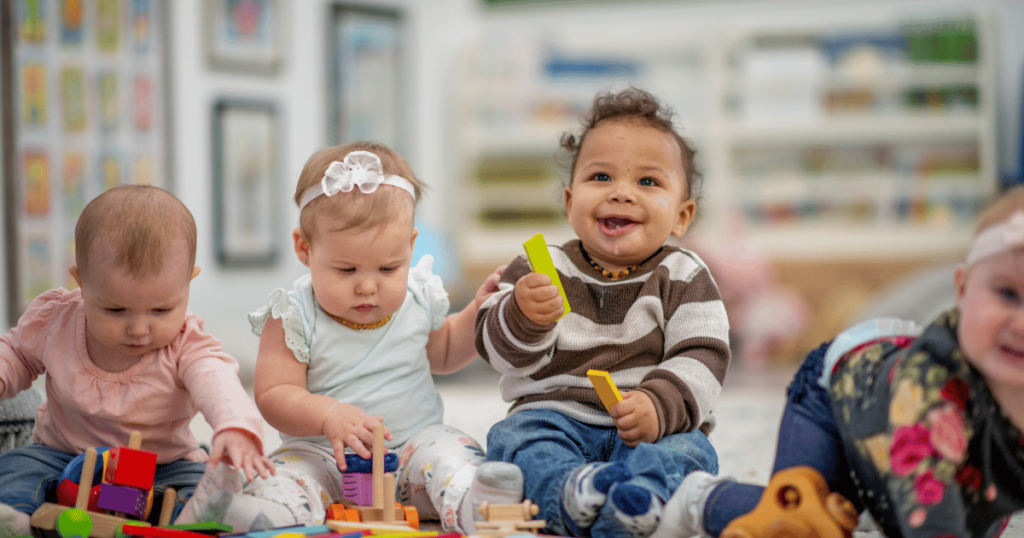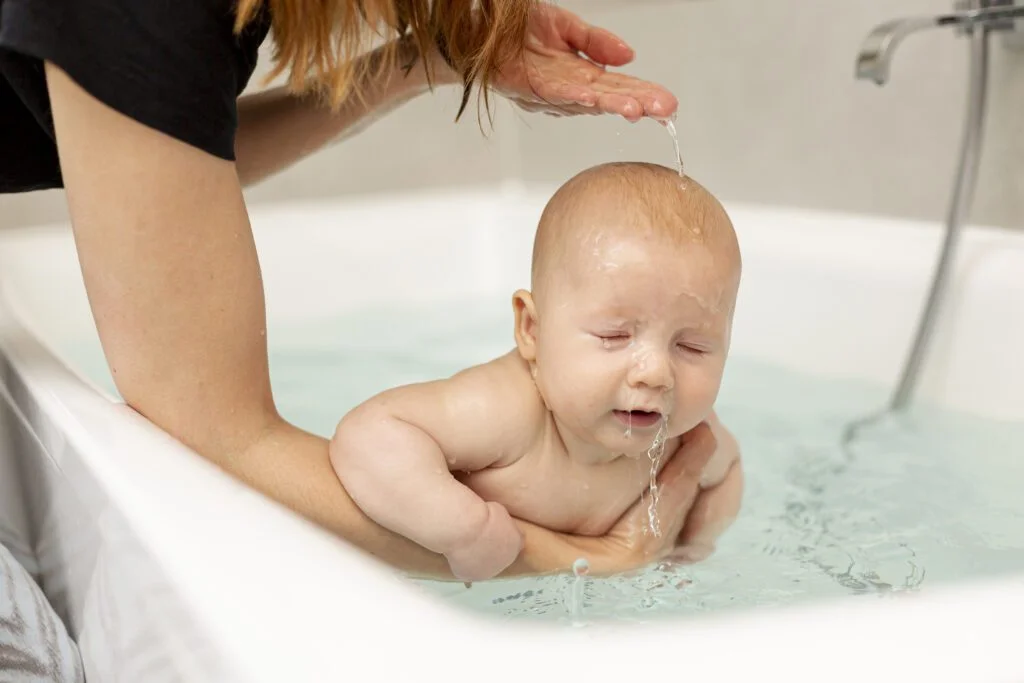Introduction
Is daycare good for babies? This is a question many new parents ask when considering childcare options. Deciding whether to enroll your baby in daycare can feel overwhelming. However, many experts agree that daycare can positively impact your baby’s development. In this article, we’ll explore how daycare benefits babies and why it might be a great choice for your family. Read on to learn more about the social, emotional, and cognitive advantages of daycare.
What is Daycare?

Daycare refers to a setting where trained caregivers look after babies and young children during the day. These facilities provide a safe, stimulating environment for children to interact, play, and learn. Daycare centers often have structured routines, which help babies develop a sense of security and belonging.
#1 Encourages Social Skills Early On

One of the most significant benefits of daycare is that it helps babies develop social skills at an early age. Babies in daycare interact with other children and adults daily, learning to communicate and play cooperatively. These interactions foster important social skills like sharing, empathy, and understanding others’ emotions.
Studies have shown that babies who attend daycare are often more adaptable and socially confident. This can help them navigate relationships better as they grow older.
Does daycare contribute to the development of social skills in babies?
Daycare greatly supports babies in developing social skills. Interaction with peers teaches sharing, emotional understanding, and communication. Caregivers model positive behaviors, fostering kindness and cooperation. Research indicates that children in daycare often become more adaptable and skilled in resolving conflicts, laying a strong foundation for future relationships.
#2 Supports Cognitive Development

Daycare environments often provide structured activities designed to promote cognitive development. Caregivers engage babies in activities like storytelling, singing, and sensory play, all of which help stimulate brain development. According to research, babies exposed to these enriching activities may show improved language and cognitive skills.
In addition, daycare helps babies get used to a routine, which fosters memory skills and problem-solving abilities.
Does daycare improve a baby’s cognitive abilities?
Daycare can enhance a baby’s cognitive abilities by providing stimulating activities like play, storytelling, and group interactions. These experiences encourage problem-solving, curiosity, and language development. Research shows that children in quality daycare often excel in language and math skills, benefiting from diverse learning opportunities and structured routines.
#3 Provides a Safe and Structured Environment

Daycare centers are designed to be safe spaces where babies can explore and learn. Caregivers maintain a structured environment with consistent schedules for meals, naps, and playtime. This consistency helps babies feel secure, as they know what to expect each day. Babies thrive on routine, and daycare centers offer a balance of structured and unstructured time, which is ideal for their growth.
This structured setting also promotes independence. Babies learn to adapt to different situations and manage separation from their parents, preparing them for future transitions, such as preschool.
Is daycare a safe environment for babies?
Daycare can be a safe environment for babies when properly regulated. Licensed facilities prioritize safety through trained staff, secure spaces, and health protocols. Caregivers monitor children closely, ensuring a protective atmosphere. Choosing a reputable daycare with good reviews can help ensure a safe and nurturing experience for your baby.
#4 Boosts Immune System

While it’s true that babies in daycare are exposed to more germs, this can be beneficial in the long run. Babies who attend daycare often build stronger immune systems because they are exposed to different types of bacteria and viruses early on. Over time, their bodies learn to fight off these infections more effectively, making them more resilient as they grow older.
According to a study published in the American Academy of Pediatrics, children who attend daycare are less likely to experience severe illnesses in their later school years.
Does daycare exposure improve a baby’s immune system?
Daycare exposure can strengthen a baby’s immune system. When infants interact with peers, they encounter various germs, helping their bodies build immunity. This early exposure can reduce the likelihood of infections later on. Additionally, social interactions contribute to overall health, promoting resilience in their immune responses as they grow.
#5 Offers Emotional Benefits for Both Parents and Babies

Daycare not only benefits babies but also provides emotional relief for parents. Parents can focus on their work or personal tasks, knowing their baby is in a safe, nurturing environment. This balance can reduce parental stress and allow them to enjoy quality time with their baby outside of daycare hours.
Babies, too, gain emotional stability. They build connections with caregivers and peers, learning to express and regulate their emotions. These early emotional skills are crucial for future well-being.
Does daycare facilitate emotional development in babies?
Daycare supports emotional development in babies by providing opportunities for social interaction. Engaging with peers helps infants recognize and express feelings, fostering empathy and emotional awareness. Caregivers also model emotional regulation, teaching babies how to cope with frustrations and build resilience, which are essential skills for healthy emotional growth.
Common Concerns About Daycare

While there are many benefits, some parents may still have concerns about sending their babies to daycare. Here are a few frequently asked questions:
- Is daycare bad for attachment?
No, babies can form secure attachments with their parents even when attending daycare. Consistent attention at home strengthens this bond. - Will my baby be neglected in daycare?
Quality daycare centers have trained staff who ensure every baby’s needs are met, from feeding to playing to sleeping. - How do I choose the right daycare?
Look for licensed centers with low child-to-caregiver ratios, a clean environment, and positive reviews from other parents. Checking out their curriculum is also essential.
Tips for Choosing the Right Daycare

If you decide to enroll your baby in daycare, here are some tips to make the best choice:
- Check the Staff-to-Baby Ratio: Make sure there is enough staff to provide individual attention to each baby.
- Visit in Person: Take a tour of the facility to observe how caregivers interact with the babies.
- Ask About Safety Measures: Confirm that the daycare follows safety protocols, such as secure entrances and proper sanitation.
- Observe the Environment: Look for cleanliness, toys, and spaces where babies can safely explore and play.
- Get Reviews from Other Parents: Speak to other parents about their experiences with the daycare to get real-life insights.
Common Questions About Daycare
What are the downsides of enrolling your child in daycare?
Putting your child in daycare can have several disadvantages. One concern is that children may not receive individual attention. In larger daycare settings, staff may be stretched thin, making it hard to cater to each child’s unique needs. Additionally, the risk of illness can increase, as many children share close quarters. Some kids may experience anxiety when separating from their parents, which can lead to tears and distress. Parents might also face challenges with inconsistent care, as staff turnover can disrupt a child’s routine and sense of security.
What is the quality of baby daycare in the USA?
Baby daycare in the USA varies significantly in quality. Some centers provide excellent care, with trained staff and engaging programs. They focus on early childhood development and create a nurturing environment. However, others may lack proper accreditation or training, which can affect the care quality. It’s essential for parents to research and visit facilities to ensure they choose a daycare that meets their child’s needs.
How can I tell if my baby is unhappy at daycare?
Several signs can indicate that a baby is not enjoying daycare. If your baby frequently cries during drop-offs or seems withdrawn, these may be red flags. Changes in behavior, such as increased fussiness or reluctance to engage with caregivers, can also signal unhappiness. Additionally, physical symptoms like trouble sleeping or eating may arise when a baby is stressed.
Is daycare a beneficial option for my baby?
Deciding if daycare is the best option for your baby depends on several factors. Daycare can offer socialization opportunities, helping babies interact with other children and develop essential skills. However, it’s vital to assess your baby’s temperament and needs. Some babies thrive in group settings, while others may prefer a quieter, more individualized environment.
How should I choose a daycare for my infant?
Selecting a daycare for your infant requires careful consideration. Start by researching local facilities and checking reviews. Visit potential centers to observe their environment and staff interactions. Ask about staff qualifications, safety measures, and the caregiver-to-child ratio. Trust your instincts and choose a place where you feel comfortable leaving your baby.
What prompted you to remove your children from daycare?
Personal experiences often lead parents to pull their children from daycare. Common reasons include concerns about the quality of care or safety issues. Some parents may notice that their child is not thriving or developing as expected. Others might find that the daycare environment does not align with their family values or parenting style. Communication with caregivers and observing your child’s behavior can guide this decision.
Conclusion
Daycare can be a wonderful option for both babies and parents. It promotes social, cognitive, and emotional development while providing a safe and structured environment. While there may be some initial concerns, many of these can be resolved by selecting a high-quality daycare facility. With proper care, babies can thrive in daycare, giving parents peace of mind and babies the foundation they need for future success.
Other References
- American Academy of Pediatrics (AAP)
- What to Expect – March of Dimes
- KidsHealth from Nemours
- American Dental Association (ADA)
- WebMD
- What to Expect
- BabyCenter
- Verywell Family
- The Spruce
- Healthy Children
More to Read
- How to bathe a newborn baby in 13 steps: The comprehensive guide
- Getting the temperature just Right: A guide to baby bath water
- Bath Time: How often should you wash your little one
- Baby Bathtubs: The Best 5 Ways to Store Baby Bathtubs in 2024
- 4 Steps to Choose a Collapsible Baby Bathtub in 2024
- The Best 5 Baby Bathtubs for Small Space in 2024
- The Best 5 Inflatable Baby Bathtubs In 2024




Hey there! Do you know if they make any plugins to safeguard
against hackers? I’m kinda paranoid about losing everything
I’ve worked hard on. Any suggestions?!